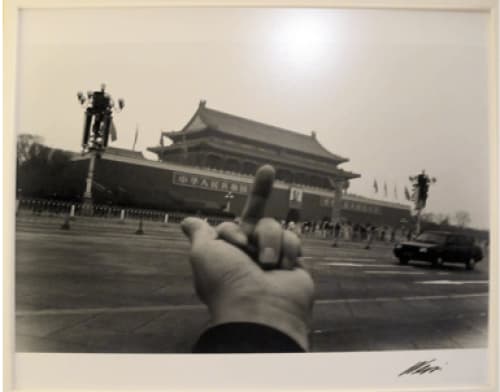Ai Weiwei was born in 1957 in Beijing and now lives and works in Portugal. He attended Beijing Film Academy and later, on moving to New York (1983–1993), continued his studies at the Parsons School of Design. Major solo exhibitions include Kunsthal Rotterdam, Netherlands (2023); The Design Museum, London, UK (2023); Albertina Modern, Vienna, Austria (2022); Kettle's Yard, Cambridge, UK (2022); Serralves Museum, Porto, Portugal (2021); Cordoaria Nacional, Lisbon, Portugal (2021); Imperial War Museum, London, UK (2020); K20/K21, Düsseldorf, Germany (2019); OCA, São Paulo, Brazil (2018); Corpartes, Santiago, Chile (2018); Mucem, Marseille, France (2018); PROA, Buenos Aires, Argentina (2017); Sakip Sabanci, Museum, Istanbul, Turkey (2017); Public Art Fund, New York, NY, USA (2017); Israel Museum, Jerusalem (2017); Palazzo Strozzi, Florence, Italy (2016); 21er Haus, Vienna, Austria (2016); Helsinki Art Museum, Finland (2016); Royal Academy, London, UK (2015); Martin Gropius Bau, Berlin, Germany (2014); Indianapolis Museum of Art, IN, USA (2013); Hirshhorn Museum and Sculpture Garden, Washington D.C., USA (2012); Taipei Fine Arts Museum, Taiwan (2011); Tate Modern, London, UK (2010) and Haus der Kunst, Munich, Germany (2009). Architectural collaborations include the 2012 Serpentine Pavilion and the 2008 Beijing Olympic Stadium, with Herzog and de Meuron. Among numerous awards and honours, he won the lifetime achievement award from the Chinese Contemporary Art Awards in 2008 and was made Honorary Academician at the Royal Academy of Arts, London in 2011. His human rights work has been recognised through the Václav Havel Prize for Creative Dissent in 2012 and Amnesty International’s Ambassador of Conscience Award in 2015.
